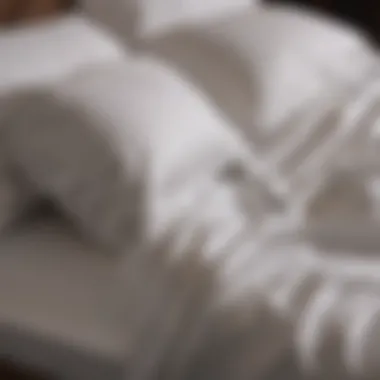The Art of Tucking: Mastering Your Bed Sheets


Intro
Keeping bed sheets tucked in is often seen as a minor detail in the larger context of bedroom aesthetics. However, its significance extends far beyond appearances. Tucked sheets can enhance sleep quality, reduce nighttime disturbances, and contribute to a sense of order and calm within the bedroom environment.
In this guide, we will delve into the various techniques for securing your sheets effectively. We will explore the benefits of maintaining a well-tucked bed, not just for visual appeal but also for improved functionality. The process will involve practical tips that can help anyone achieve a neat arrangement, promoting both comfort and organization in their sleeping space.
The following sections will comprehensively outline the methods, benefits, and best practices for keeping sheets in place, crucial for those aiming for a serene nighttime experience.
Intro to Tucked-in Sheets
Bed-making is not just a matter of aesthetics. It impacts various aspects of our lives, from comfort to mental health. This section will explore the significance of keeping sheets tucked in. A well-made bed with sheets that are properly tucked provides not only visual appeal but also contributes to better sleep quality.
Maintaining a tidy sleep environment leads to a sense of order and control over one’s space. Tucking in sheets prevents them from shifting throughout the night, ultimately enhancing comfort. Furthermore, a neatly made bed can play a vital role in one's mental well-being, fostering a calming atmosphere conducive to rest.
Understanding the Importance of Tucked Sheets
Understanding why sheets should be tucked is fundamental. The primary reason revolves around the comfort derived from a tidy bed. When sheets are secure, there is reduced risk of tangling or bunching, which can disrupt your sleep. This is particularly true for those who move during sleep; loose sheets can contribute to disturbances, reducing sleep efficiency.
Moreover, the aesthetic impact of tucked sheets should not be underestimated. A neatly made bed sets a positive tone for the day, reinforcing the idea of personal organization. This practice can create an inviting environment, making you more likely to enjoy your bedroom space.
Cultural Perspectives on Bedmaking
Across cultures, the act of bedmaking holds various symbolic meanings. In some traditions, a well-made bed represents respect for oneself and one’s living space. In others, it reflects a commitment to cleanliness. For instance, in Japanese culture, futons are often laid directly on tatami mats and are tucked away during the day. This not only conserves space but also emphasizes the importance of everyday order.
In many Western cultures, the act of making the bed is deemed a practical necessity. The concept of starting the day with a made bed is often correlated with higher productivity. The practice of tucking in sheets signifies a commitment to comfort and aesthetic beauty. As such, it becomes an intrinsic element of daily life.
"A made bed is the foundation of a serene bedroom and a restful mind."
Overall, understanding the significance and various cultural connotations surrounding tucked sheets adds depth to the seemingly simple act of making a bed. It frames the narrative around bed-making as not just a chore, but as a meaningful ritual.
Sleep Quality and Bed Organization
Sleep quality is an essential factor that influences overall health and wellbeing. An organized bed plays a significant role in promoting better sleep. A tidy sleeping environment can help signal to the brain that it is time to relax and unwind. Conversely, a messy bed can create an atmosphere of chaos that might interfere with one's ability to fall asleep.
Having neatly tucked-in sheets contributes to a more pleasant sleeping experience. When sheets are secured properly, there is less friction against the skin during the night. This encourages comfort and reduces the feeling of restlessness. Furthermore, the act of organizing the bed can provide a sense of accomplishment. This small victory can boost a person's mood and mindset before they drift off.
Additionally, an organized bed can facilitate the maintenance of hygiene. Dust, allergens, and other irritants can accumulate in a messy bed, impacting respiratory health during sleep. By keeping the bedding tidy, individuals can help create a healthier sleeping environment.
The Impact of Bed Organization on Sleep
The way a bed is organized affects sleep in various manners. A well-arranged bed typically means that the pillows and blankets are arranged neatly, providing easy access and comfort for the sleeper. This organization can lead to fewer disturbances during the night since everything is in its place, minimizing the need for adjustment.
Studies have shown that individuals with organized sleep spaces report higher levels of satisfaction with their sleep quality. An orderly environment fosters positive mental states, which can enhance the quality of rest. People are likely to experience deeper slumbers when they feel secure in their environment.
"A clear space often leads to a clear mind."


Simple habits, like making the bed every morning, can reinforce this organization. This practice not only creates an inviting atmosphere but also prepares the mind to associate the bed with comfort and restfulness.
Effects of Untidy Bedding on Comfort
Untidy bedding can lead to several discomforts that disrupt sleep. Sheets that are bunched up or misaligned can cause sleep disturbances. A tangled sheet can even lead to waking up in the middle of the night because of discomfort. The average person tosses and turns during sleep, so disheveled bedding can greatly contribute to restlessness.
Moreover, chaotic bedding can attract pests like dust mites or bed bugs, leading to potential allergic reactions. Disorganization may also affect one's mental state, creating feelings of stress or anxiety that inhibit sleep.
Maintaining a regularly organized bed can mitigate these discomfort levels. It is advisable to inspect and organize sheets regularly, ensuring sheets are clean and free of debris. A simple act, like smoothing out the sheets before sleep, can drastically enhance comfort.
In summary, both bed organization and the state of bedding significantly influence sleep quality. Prioritizing these factors can yield substantial benefits for the overall wellbeing of individuals.
Methods for Tucking Sheets In
Understanding the methods for properly tucking sheets is crucial for creating a restful sleeping environment. An organized bed can enhance not only the aesthetic appeal of your bedroom but also significantly improve sleep quality. When sheets are securely tucked in, they prevent movement that can disrupt sleep. Moreover, various techniques exist suited to different types of beds and personal preferences. Knowing these methods can empower individuals to tailor their bed-making process to meet their comfort needs effectively.
The Classic Hospital Corner Technique
The hospital corner technique is perhaps the most recognized method for tucking sheets securely. Originating from the need to keep bed coverings neat in medical settings, this method provides stability and cleanliness. Steps to execute this technique are as follows:
- Begin with a Flat Sheet: Lay the flat sheet over the mattress, ensuring equal lengths on either side.
- Tuck Under the Foot of the Bed: Take the bottom edge of the sheet and tuck it securely under the mattress.
- Create the Corner: Pull the side of the sheet up so it stands vertically along the side of the mattress. Create a square fold by bringing the top edge down and tucking the excess fabric under the mattress.
- Repeat on the Opposite Side: Finish by replicating the process on the other corner of the bed.
This technique, while requiring some practice, provides a neat and professional appearance. Its primary advantage lies in its effectiveness in keeping sheets in place throughout the night.
Alternative Techniques for Secure Tucking
For those who may find the hospital corner method cumbersome, several alternative techniques can also maintain a tidy bed. These include:
- The Booty Tuck: A simpler method, this involves pulling the sheet tightly at the foot of the bed and tucking it under the mattress without the need for folding corners.
- Bungee Cord Method: This involves using elastic bands or cords to hold sheets securely at the corners. This option is particularly useful for deeper mattresses where traditional methods may not suffice.
- Sheet Straps: Specialized products are available, such as adjustable sheet straps, that clamp onto the sheets and hold them firmly in place.
Each of these techniques offers unique benefits that cater to different preferences or bedding situations. Experimentation is key to finding the method that works best.
Choosing the Right Sheets for Tucking
The choice of sheets plays a pivotal role in how well they can be tucked. It is essential to consider several aspects when selecting sheets:
- Material: Cotton sheets generally hold their shape better than synthetic materials. Look for options that combine durability with comfort.
- Fit: Ensure that the sheets are appropriately sized for your mattress. Ill-fitting sheets are likely to come loose more quickly.
- Elasticity: Some sheets come with thicker elastic bands that grip the mattress more effectively, reducing the chances of them loosening during the night.
Selecting the right sheets can augment the effectiveness of any tucking method, making sure your bed remains tidy and inviting. An adequate combination leads to improved overall satisfaction with your sleeping environment.
Products Designed for Tucked Bedding
Keeping sheets neatly tucked in is supported by a variety of products designed specifically for this purpose. These products can enhance the overall experience of bedmaking and contribute to a more organized bedroom environment. By utilizing these tools, individuals can not only simplify the process of tucking sheets but also ensure that their bedding remains secure throughout the night.
Sheet Straps and Clips
Sheet straps and clips are innovative solutions to the common problem of sheets coming loose. These products are generally elastic bands or clips that secure the corners of fitted sheets to the mattress. They work by holding the sheet tightly in place, preventing it from shifting as one moves during sleep. The effectiveness of these items can greatly enhance sleep quality by offering a smooth and comfortable sleeping surface.


When selecting sheet straps, consider the size and type of your mattress. Many straps are adjustable, allowing for a snug fit regardless of the mattress size. Using these tools can eliminate the frustration stemming from disheveled bedding, leading to a more peaceful night’s rest. Furthermore, they often come in various colors, adding a touch of personal style to your bedding.
"Investing in proper bedding accessories like straps can transform your sleep experience by maintaining a tidy appearance and enhancing comfort."
Tuck-In Sheets: A Specialized Option
Tuck-in sheets are designed specifically to facilitate the process of keeping bedding secure. These sheets typically feature extra length or unique design elements that allow them to stay tucked easily under the mattress. This specialized design can significantly reduce the amount of effort needed to achieve a neat and tidy bed.
Opting for tuck-in sheets can resolve many frustrations associated with standard sheets. They provide a smoother and more stable surface, which can improve overall sleep quality. Additionally, since they are specifically manufactured for this purpose, they often come with added benefits such as breathability and comfort.
Choosing the right tuck-in sheets requires attention to detail, particularly in terms of fabric and fit. High-quality materials not only enhance comfort but also ensure longevity. Individuals should evaluate their preferences, including factors such as texture, weight, and durability.
Psychological Aspects of a Tidy Bed
A tidy bed plays a vital role in how we perceive our personal space and its effect on our mental well-being cannot be understated. When the sheets are neatly tucked in and the bedding looks inviting, it can create an atmosphere of order and calm. This is particularly significant given that our immediate environment greatly affects our state of mind. An organized bedroom can foster a sense of control and peace, whereas a disordered one might lead to feelings of stress and chaos. Therefore, understanding the psychological aspects of a tidy bed is essential for improving both sleep quality and daytime productivity.
The Role of Environment in Sleep Hygiene
The environment we sleep in has a direct impact on our sleep hygiene. Sleep hygiene refers to habits and practices that can help enhance sleep quality. A tidy bed contributes significantly to creating a conducive sleep environment. Well-organized bedding can signal to your brain that it is time to unwind and rest.
Maintaining a consistent bedtime routine becomes easier with a clean and orderly space. Studies suggest that individuals who sleep in well-organized environments tend to experience less stress and improve their overall mood. To enhance sleep hygiene, consider these points:
- Minimize Clutter: Keep items away from the bed area. This can help remove distractions.
- Create Calm Ambiance: Soft colors and simple designs in the room can help promote relaxation.
- Natural Elements: Consider adding indoor plants to improve air quality and enhance the aesthetic of the bedroom.
Aesthetic Appeal and its Effects on Mood
A neatly made bed has an undeniable aesthetic charm. It can significantly influence how one feels upon entering a bedroom. An inviting bed can evoke feelings of warmth and security. Conversely, an untidy sleeping area can detract from this sense of comfort.
The interaction between our environment and our emotions is well-documented. For example, walking into a well-kept room can elicit positive emotions, boosting one’s overall mood. On the other hand, an unkempt space can lead to feelings of laziness and discontent.
Incorporating different shades and textures can enhance visual appeal. Experiment with various pillow arrangements, and use color-coordinated bedding to create a pleasing look. Furthermore, remember that lighting plays a crucial role in setting the mood. Soft lights can enhance relaxation, making the bed seem more appealing during nighttime.
In summary, the tidiness of one’s bed has profound psychological implications. By embracing well-kept sheets and organized bedding arrangements, individuals can foster a healthier mindset, improve sleep hygiene, and cultivate a more inviting personal space.
"A tidy bed reflects a tidy mind, and a tidy mind is essential for a restful night."
Emphasizing the need for maintaining a tidy bed not only enhances its aesthetic but also influences psychological well-being.
Addressing Common Challenges
Maintaining neatly tucked sheets can sometimes feel like an uphill battle. Various factors may contribute to sheets coming untucked, yet understanding these challenges empowers individuals to manage them efficiently. Both personal habits and external influences can disrupt the neat appearance and functionality of bed linens. Being aware of these challenges not only creates a more relaxing sleep experience but also promotes a tidy bedroom environment.
Dealing with Moving Sheets During Sleep
It is common for sheets to shift and come untucked during the night. This movement often results from tossing and turning or incorrect sheet sizes. To address this issue effectively, consider the following approaches:


- Select the Right Size: Ensure that the fitted sheets correspond accurately to the mattress dimensions. An ill-fitting sheet will naturally be more prone to slide off.
- Use Deep-Pocket Sheets: If your mattress is thicker than average, investing in deep-pocket fitted sheets can provide a better grip and reduce movement.
- Secure with Clips or Straps: Utilizing specialized sheet straps can help hold the bedding in place more securely, preventing the frustration of waking up to a messy bed.
- Adjust Sleeping Position: Sometimes, simply being conscious of how one sleeps can minimize the extent to which sheets are disturbed.
It is essential to find a solution that fits personal sleeping habits. After all, peaceful sleep is an important aspect of overall health.
Maintaining Tucked Sheets with Pets
For those who share their sleeping space with pets, the battle against untucked sheets can be even more challenging. Pets love to curl up in beds, which can lead to movement in bed linens. Here are several strategies to maintain a tidy bed with furry companions:
- Designate a Pet Area: Train pets to use specific areas of the bed or provide comfortable alternatives, such as pet beds.
- Use Heavyweight Sheets: Opting for thicker, heavier sheets may help them stay in place better despite the additional movement caused by pets.
- Implement a Bedding Routine: Regularly tucking and adjusting the sheets while making the bed can reinforce consistency. It can also serve as a reminder to manage the pet's presence on the bed.
- Consider Washable Covers: Investing in washable throws or covers can make it less of a burden to maintain neatness in bedding while accommodating pets.
Finding a balance between comfort for both pets and the aesthetic of the bed is crucial. Taking these steps can ensure a harmonious sleeping environment for everyone involved.
Caring for Tucked-In Linens
Caring for tucked-in linens is crucial for both the longevity of your bedding and the quality of your sleep environment. Bedding not only serves a functional purpose but also enhances the overall aesthetic appeal of a bedroom. When sheets are tucked properly and maintained well, they contribute to a tidy look, which can have a positive impact on an individual's mindset before sleep.
Best Practices for Washing and Drying Bedding
Maintaining tucked-in linens involves careful washing and drying practices. It is essential to follow the care labels on your sheets as fabrics can vary widely. Here are some key practices:
- Use cold water for washing most types of linens. This helps to preserve colors and fabrics.
- Choose gentle detergents that are free from harsh chemicals. This is vital for keeping sheets soft and reducing allergens.
- Avoid fabric softeners. They can leave a residue that affects the feel of your sheets and their ability to wick moisture.
Drying can also significantly affect the durability of your linens:
- Air drying is preferred if possible. It helps to maintain the fibers and keeps sheets smelling fresh.
- If using a dryer, select a low heat setting to prevent shrinkage. This is particularly important for cotton or breathable linens.
Taking care during washing and drying not only helps keep sheets looking good but also enhances their feel, making for a more comfortable sleeping surface.
Frequency of Changing Sheets
Changing your sheets regularly is another important aspect of caring for tucked-in linens. A standard recommendation is to change bed sheets every week. However, this can vary based on factors such as:
- Personal preference: Some may find that a weekly change feels fresher.
- Allergies or sensitivities: Those who suffer from allergies might benefit from more frequent changes to reduce dust mites and other allergens.
- Lifestyle: If you sweat a lot at night or share your bed with pets, consider changing sheets more often.
A fresh set of sheets can affect sleep quality. Clean linens contribute to a sense of comfort and cleanliness, which can promote relaxation and better rest.
The End: The Significance of Keeping Sheets Tucked In
Maintaining tucked-in sheets is more than just a matter of aesthetics; it significantly impacts various aspects of daily life. This practice contributes to enhanced sleep quality and promotes a sense of organization. When sheets are properly tucked, they create a serene environment essential for restful sleep. The tucked appearance radiates cleanliness and order, affecting psychological well-being. Properly positioned bedding can lead to improved mood and reduced anxiety, allowing individuals to rest with more peace of mind.
The methods discussed help readers appreciate the significance of tucking sheets in not simply as a chore, but as a step toward creating a more harmonious living space. By adopting the techniques outlined, individuals can enjoy both functional and aesthetic advantages. Below are some key insights that highlight the value of this practice:
Recap of Key Insights
- Enhanced Comfort: Tucked sheets prevent discomfort caused by shifting bedding during sleep. This results in fewer disturbances, ensuring a better sleep experience.
- Improved Organization: A made bed sets a positive tone for the room. It encourages a tidy environment that can facilitate better focus and relaxation during waking hours.
- Psychological Benefits: A well-maintained bed can promote feelings of accomplishment and control, which are vital for mental health. The visual appeal of tucked sheets can also serve as a source of inspiration.
"A tidy bed is an often overlooked aspect of mental clarity and sleep hygiene."
Encouragement for Consistent Practicing
To truly reap the rewards of this practice, consistency is key. Incorporating the act of tucking in sheets into daily routines can cultivate a healthier mindset and improve overall quality of life. Here are some practical tips to encourage this consistency:
- Establish a Routine: Set a specific time each day for making the bed. Morning habits can set a constructive tone for the rest of the day.
- Involve Others: If you live with family or roommates, include them in the practice. This can enhance cooperation and turn it into a shared ritual.
- Invest in Quality Linens: Choose sheets that fit well and feel comfortable. High-quality bedding can make tucking in more enjoyable.















